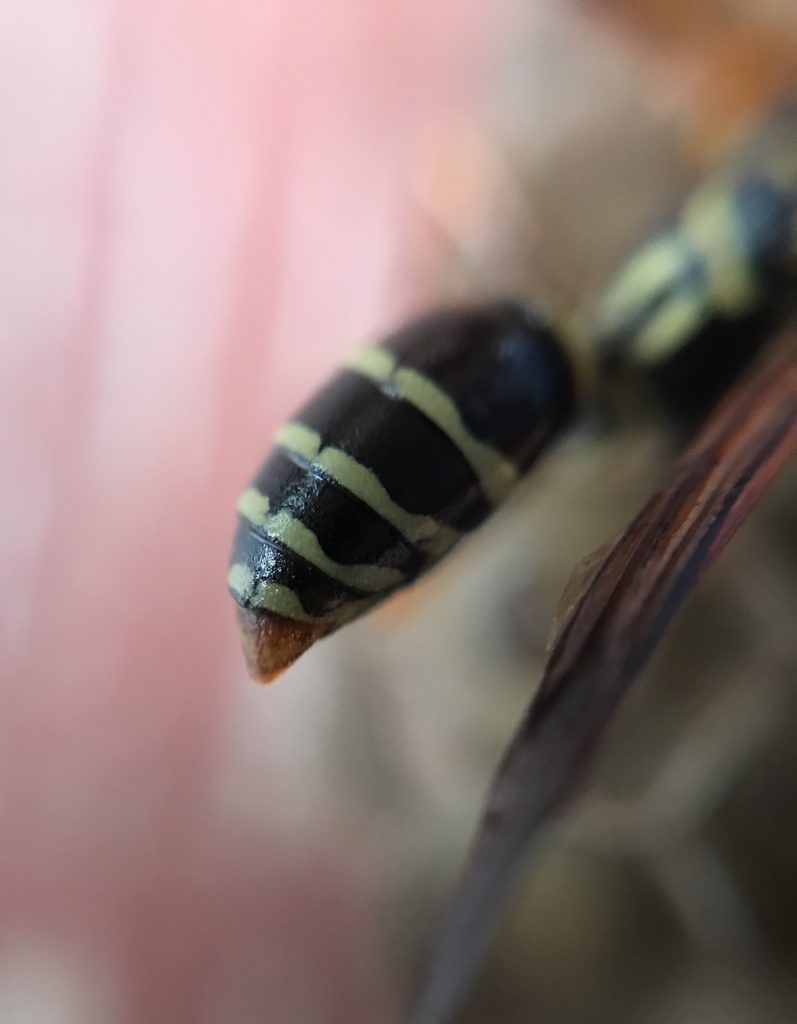Since children are much smaller targets and live closer to the ground than most adults, you would think they would be the most adept at avoiding wasp stings. Unfortunately, this does not seem to be the case. Maybe this is because youth play outside more or because wasps are just bullies that sometimes pick on little ones. Regardless, what does a wasp sting feel like?
Why Do Wasps Sting?
Interestingly, this is not a one size fits all question in the world of wasps. Social wasps live quite different lives from solitary wasps. Their different lifestyles lead to different behaviors.
Solitary wasps typically sting to paralyze their prey to store in the nest with their brood. This gives the larvae fresh meat to feed on after hatching instead of old spider jerky. Solitary wasps may still use their stingers to defend, but they have a much clearer picture of what is theirs and what needs to be defended than some of the social wasps.
Social wasps have a food barter system that motivates regular use of their sting attack. The larvae back in the nest will give the adults sweet secretions in exchange for meaty chunks of food. This system motivates the wasps to be avid hunters. Also, due to their nature, they are much more territorial and prone to fits of rage. These usually end up in “defensive” stings when people didn’t even know they were encroaching.

Which Wasps Sting?
The most important point when considering which wasps sting is the sex of the wasp at hand. Since the “stinger” is an ovipositor, you can be certain that a stinging wasp is female.
The second way to look at stinging grouping is by species. The vast majority of wasp species are actually stingless. This includes wasps from the superfamily Ichneumonoidea. Most of the wasp stings that we deal with come from yellow jackets, hornets, and paper wasps.
It is helpful to know the differences among these wasps and understand the stingless crew are beneficial and do not carry the same threat to us that their menacing relatives do.
It is also important to remember that wasps are quite different from bees.
What Do Wasp Stings Feel Like?
I always wonder if things that I feel are the same as what other people feel. Throughout the years, I have explored this subject with wasp stings, but have not had much luck in finding a conclusive answer. There are far too many variables at play such as:
- type of wasp
- type of venom injected
- whether the sting gets infected
- allergic reactions to stings
- difficulty in distinguishing bites from stings
- some people smash the wasp in the act jamming the ovipositor down deeper into their flesh (some of our reflexes work against us)
- pain thresholds that differ from person to person
- inadequate language for descriptions
Regardless of all of the factors, the one thing that holds true is that it hurts. General consensus tends to include the following descriptions:
- quick sharp jabbing or zapping pain
- growing sensitivity/increased pain
- sensation similar to post-burn symptoms
- gradual shift to itchiness at some point
What To Do About Wasps
Wasps have their place, just not at your place or mine, right?! If wasps are a nuisance or simply something you don’t want to deal with down the road, we’re here to help. The experts at Rove Pest Control know which wasps need which treatment. We also know which signs to watch for to start the defensive front early. Reach out today to find out how to best keep your wasp worries out of the way of more important things.
